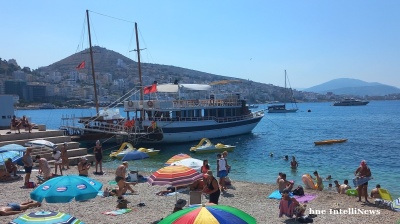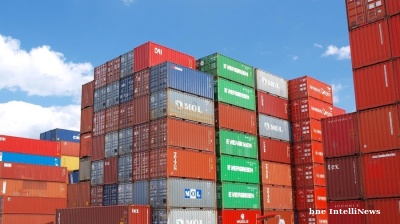On September 5 Bloomberg scored a scoop after it published the details of a confidential report for Russia’s top politicians on the real state of the economy. It made for bleak reading and was much more pessimistic about the outlook for the country in the coming years than the public comments made by the liberal finance team that run economic policy. However, the report is actually one of many being prepared by Russia’s ministries and was leaked by the authors as part of an annual process of lobbying by ministries to get their version adopted as the budget law, says consultants Macro Advisory.
The Bloomberg report outlined three scenarios, with two of them predicting that the contraction will accelerate next year and Russia returning to its pre-war size only after a decade at the earliest. Under the three scenarios, the Bloomberg report said that by 2030 the economy will be:
- Target: 17-18% above the 2021 level
- Inertial: about 4% higher than 2021
- Stress: about 4% below the 2021 level.
“Russia may face a longer and deeper recession as the impact of US and European sanctions spreads, handicapping sectors that the country has relied on for years to power its economy,” Bloomberg reported, citing the internal assessment prepared for the government.
Bloomberg viewed a copy of the report, drafted for a closed-door meeting of top officials on August 30 when the government met to choose the economic forecasts used to prepare the new budget law, and people familiar with the deliberations confirmed its authenticity.
However, Macro Advisory CEO Chris Weafer says that the report is not to be taken entirely at face value.
“A government report, leaked to Bloomberg, shows a scenario where the economy suffers a steeper-for-longer decline. This is widely interpreted as meaning that the government is secretly assuming a much more difficult economic outlook and greater damage from sanctions than the generally more optimistic statements and current data show,” Weafer wrote in an assessment of the report.
“This interpretation is completely incorrect. The scenario is one of several prepared as part of the three-year budget planning process and which takes place this time of year annually. There are several other scenarios which show a much more positive result than the current consensus,” Weafer added. “The Finance Ministry always assumes quite pessimistic revenue assumptions as it strives to rein in spending expectations from other ministries. The Economy Ministry is amongst those with an opposing position and who wish to assume more optimistic revenue expectations in support of their higher spending proposals.
“This Bloomberg document is not any sort of a “bombshell” that belies the generally good macroeconomic data coming out of Russia. According to Vedomosti, the Bloomberg report is more positive than a similar government report in June, which expected the economy to recover by 2030 and to be only 8.5% higher than in 2021, rather than the 17% in the target-optimistic scenario,” says Weafer.
Weafer speculates that the authors of the report leaked it as the sponsors of the pessimistic scenario are struggling to get their version of events heard and adopted by the Kremlin’s top tier ahead of drawing up the budget, which will set spending and goals in stone.
The report is part of the preparation for drawing up the three-year budget that will go through several more changes in the coming weeks, says Weafer, before it is sent to the Duma and then approved at the end of this year.
On this basis the Bloomberg report is probably one of the most pessimistic of the various forecasts being prepared ahead of setting the new budget and so should be taken as a base case against which the other reports can be measured, argues Weafer.
Question of timing
The confidential Bloomberg report comes on top of both better than expected economic results and a controversial Yale report that suggested that the economy has already collapsed. At the start of the war analysts predicted that the economic contraction this year would be at least 15%, but the latest results from RosStat put the contraction at -4.3% in the third quarter and Russia seems to be on track for the most optimistic full-year contraction estimates of between 4% and 5% from the CBR and the Economics Ministry.
However, the Bloomberg report is both more optimistic than the short-term predictions of the Yale report, yet bears out the gloomy outlook long-term outlook by the American report of stagnation and permanent low growth in the future.
The most optimistic scenario in the Bloomberg report sees the economy bottoming out next year at 8.3% below the 2021 level, while the “stress” scenario puts the growth nadir in 2024 at 11.9% under last year’s level.
Supporting the idea that different ministries are attempting to get their preferred policy package heard, there have been more leaks and statements since the Bloomberg report was leaked last week.
On September 6 another report was leaked to Vedomosti with a much more optimistic outlook, citing the Ministry of Economic Development and Trade (MEDT) saying that 2030 GDP is expected to be 17% higher than in 2021.
The Vedomosti report says that in 2024-25, GDP growth is expected to be around 2.6%, and around 3% after that. In other words, the Ministry for MEDT is adhering to the optimistic scenario.
“This suggests that the target, or optimistic, scenario is realistic if the government successfully executes its anti-crisis policy,” says Weafer.
A week after the Bloomberg report was leaked, Economy Minister Reshetnikov, probably under a directive from the Administration, also pre-announced the growth outlook from the latest version of the official macro forecast which his ministry is busy putting together. He came out with one of the most optimistic prognoses to date, forecasting Russian GDP to:
- contract by 2.9% year on year in 2022
- contract by 0.9% in 2023
- grow by 2.6% in 2024.
“A perennial feature of Russian economic policy is a debate every August-September about economic scenarios and government revenues. Typically, the MEDT is more optimistic and the Ministry of Finance (MinFin) is more pessimistic. This is because the former wants more spending to generate growth, which is its key KPI. The MinFin, on the other hand, prefers more pessimistic forecasts so it can impose fiscal prudence on the other ministries. These leaks are part of this debate,” says Weafer.
Still, the government is clearly worried about an increase in pressure from more sanctions. All the Bloomberg report scenarios see the pressure of sanctions intensifying, with more countries likely to join them. Europe’s sharp turn away from Russian oil and gas may also hit the Kremlin’s ability to supply its own market, and the ban on Russian oil imports that is slated to come into effect in December is expected to significantly reduce oil revenues, which have been booming for most of this year.
The Bloomberg report is worried about the “blockade” on Russian trade that has affected all forms of transport, made worse by the technological curbs and restrictions imposed on Russia’s ability to transact with the rest of the world that are the essence of the SWIFT sanctions that were imposed only days after Russia’s invasion of Ukraine in February. The brain drain that began with a hoard of IT specialists leaving in the first months of the war will continue with another 200,000 engineers leaving the country, the Bloomberg report predicts.
Publicly, officials say the hit from sanctions has been less than feared, but privately the document suggests the government is expecting the economy to be permanently damaged, from which it cannot fully return to even its pre-war growth potential without access to modern technology that is almost all controlled by the West.
Policy plans and problems
The report goes on to outline some policy choices to revive the Russian economy, calling for a raft of measures to support growth and further ease the impact of the restrictions. However, Bloomberg reports that the proposals include many of the same measures to stimulate investment that the government has already unsuccessfully pushed in the last decade.
The Bloomberg report highlighted in particular the ban on exports to Russia of technology related to the energy industry as “critical.” Old oilfields in western Siberia need sophisticated horizontal drilling equipment to get to the last pockets of oil in the almost depleted structures. This is exclusively made in the West. Even more serious is the equipment needed to produce LNG that Russia can’t make on its own that could kill off its ambitions to exploit the Arctic and become an LNG powerhouse. Moreover, bans on export of oil and gas to Europe could reduce domestic production and so lead to an economic slowdown of the domestic economy.
Metals producers are also already losing $5.7bn a year from the restrictions, the report said, that could have knock-on effects for sectors like construction, one of the economy’s main growth drivers.
Things could get even worse if the world slips into a global recession, partly induced by the sanctions, as that will only reduce demand for Russian commodities further. The Central Bank of Russia (CBR) issued a gloomy monetary policy strategy in August that includes a global recession as one of the scenarios that the regulator is preparing to face.
A global recession and the reduction in demand for commodities would make Russia the “swing supplier” on global markets where traders can find plenty of commodities in an oversupplied market and will reduce exports further as they buy Russian inputs last. That could trigger a plunge in the ruble and a spike in inflation.
On the import side, “the main short-term risk is the suspension of production due to lack of imported raw materials and components.” Over the longer term, the inability to repair imported equipment could permanently limit growth, the report said. “There are simply no alternative suppliers for some critical imports,” the report said.
As bne IntelliNews has reported, even agriculture is in danger. The state has invested heavily into agriculture and is now one of the biggest exporters of grain in the world. At the same time, Russia has gone from a net importer of things like chicken to becoming a net exporter in recent years and is self-sufficient in most crops. But it is still heavily reliant on the import of key parts of the chain, importing almost all of its breeding eggs and seed potatoes, among other things.
CBR Governor Elvia Nabiullina already warned Russian businesses in the first months of the war that they must be prepared to “go back two generations of technology or more” to remain in production after the supply of imported equipment disappeared. Russia will be forced to rely on less advanced alternatives from China and Southeast Asia. Western sanctions even prevent “friendly” China from selling Russia its most advanced technology, as much of that is made under license using Western intellectual property.
Russian President Vladimir Putin’s development targets that are part of the 12 National Projects, including those for boosting population growth and life expectancy, will also have to be downgraded due to the lack of resources.
On a sectoral basis, the Bloomberg report paints a black picture:
- Agriculture: Fully 99% of poultry production and 30% of Holstein dairy cattle output depends on imports. Seeds for staples like sugar beets and potatoes are also mostly brought in from outside the country, as are fish feeds and aminoacids.
- Aviation: 95% of passenger volume is carried on foreign-made planes and the lack of access to imported spare parts could lead the fleet to shrink as they go out of service.
- Machine-building: only 30% of machine tools are Russian-made and local industry doesn’t have the capacity to cover rising demand.
- Pharmaceuticals: About 80% of domestic production relies on imported raw materials.
- Transport: EU restrictions have tripled costs for road shipments.
- Communications and IT: Restrictions on SIM cards could leave Russia short of them by 2025, while its telecommunications sector may fall five years behind world leaders in 2022.

Features

CEE needs a new growth model as FDI plunges
wiiw economist Richard Grieveson says the CEE region’s long-standing model of attracting FDI through low labour costs no longer works.
KSE: Ukraine is facing a $53bn budget shortfall, but economy is stable for now
Ukraine is in urgent need of additional financing from partners as the continuation of the war drives up defence spending and reconstruction needs, jeopardizes budget financing, weighs on the balance of payments, and slows economic growth.

PANNIER: Ruling family’s ‘palace in the sky’ cruel sight for Turkmenistan’s poor souls down below
Photos posted of renovated Boeing by US makeover manager offer further insight into "ultra-luxurious" world enjoyed by Berdimuhamedovs.

Russia tax service targets Russian accounts in UAE
The Russian Federal Tax Service (FTS) has ramped up its scrutiny of Russian nationals holding accounts in the United Arab Emirates, following the effective implementation of automatic tax information exchange between the two countries.



